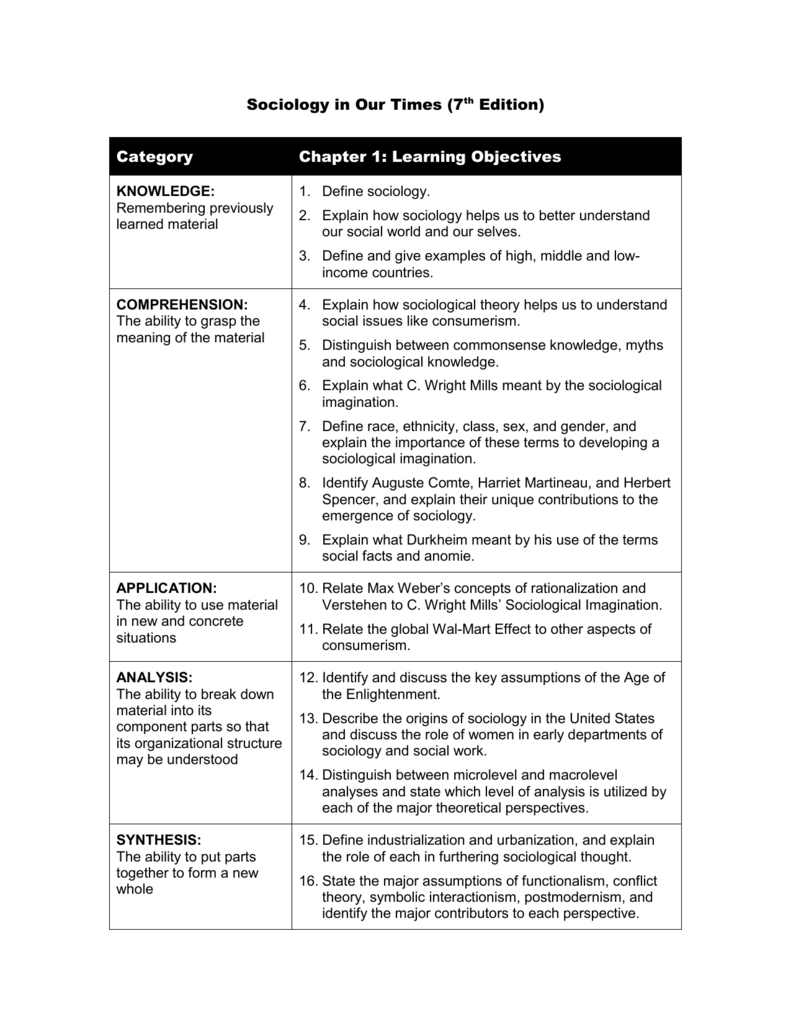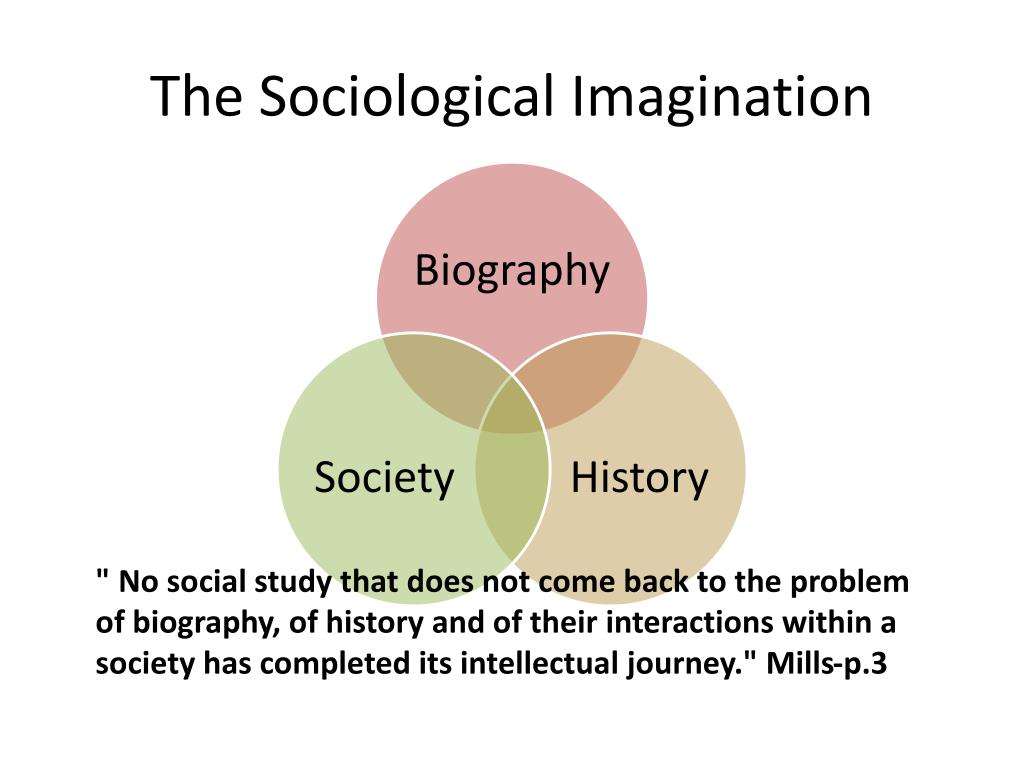The world is a complex tapestry woven with individual stories and societal forces. Sometimes, it can feel overwhelming to grasp the intricate interplay between our personal experiences and the wider social structures that shape our lives. But what if I told you there was a framework to help us make sense of this intricate dance of personal struggles and societal shifts? That’s precisely what C. Wright Mills, a renowned sociologist, offered with his concept of the “sociological imagination.”

Image: cupsoguepictures.com
Imagine this: you’re facing a job loss, and you feel a mix of anger, frustration, and fear. It’s easy to get caught up in the immediate consequences of this personal setback. But what if you could step back and consider the larger social forces at play? Maybe there’s a changing economic landscape or a shift in the industry that contributed to your situation. This is where the sociological imagination comes in. It allows us to see beyond our individual circumstances and connect them to broader social patterns.
Understanding the Power of the Sociological Imagination
Mills’s definition of sociological imagination, as articulated in his groundbreaking book “The Sociological Imagination” (1959), is a potent tool for understanding the social world. He argues that this mental ability allows us to grasp the connection between our personal lives and broader social issues. It helps us understand that individual troubles are often rooted in public issues. This concept encourages us to look at social problems not just as isolated incidents but as products of larger social structures and historical processes.
The sociological imagination is about moving beyond a purely personal lens and embracing a broader, societal perspective. Instead of viewing our experiences in isolation, it allows us to connect our own challenges to the broader social context. It encourages us to question assumptions, challenge dominant narratives, and engage critically with the social world around us.
The Power of Connecting the Personal and the Public
Imagine a student struggling to keep up with their studies. They might attribute their struggles to a personal lack of effort or ability. But through the lens of sociological imagination, we might identify underlying issues: a lack of resources at their school, societal pressures creating mental health burdens, or systemic inequalities that limit access to educational opportunities. By connecting this personal struggle to broader social forces, we can better understand the root causes and advocate for change.
The sociological imagination fosters empathy and understanding. It allows us to see the world through the eyes of others, realizing that their struggles may be shaped by similar social forces. It pushes us to move beyond judgment and seek solutions that address the root causes rather than just the symptoms.
Essential Elements of Sociological Imagination
Mills outlines three core elements of sociological imagination:
- The ability to shift perspectives: Stepping back from our individual experiences and looking at the world through a broader social lens. This involves considering the social structures, historical trends, and cultural norms that shape our lives.
- The recognition of the interplay between biography and history: Understanding that our individual stories are interwoven with the historical and societal contexts in which we live. Our opportunities, challenges, and values are influenced by the broader social milieu.
- The ability to think critically and question assumptions: Challenging dominant narratives, examining power structures, and seeking alternative explanations for social phenomena. This critical awareness allows us to identify biases, inequalities, and social injustices within our own societies.

Image: www.slideserve.com
Applying Sociological Imagination in Everyday Life
The sociological imagination is not just an academic concept. It’s a powerful tool for navigating our daily lives. By cultivating this habit of mind, we can gain new insights into our own experiences, connect with others on a deeper level, and become more engaged citizens. Here are some ways you can apply the sociological imagination:
- Challenge your assumptions: Ask yourself, “Why is this the way it is? How did we come to accept this as normal?” Reflect on the social forces that have shaped your beliefs and values.
- Seek out diverse perspectives: Engage with people who have different backgrounds, experiences, and opinions. Listen to their stories, ask questions, and be open to challenging your own preconceptions.
- Connect personal troubles to public issues: When faced with a personal challenge, consider the broader social context. Is this issue specific to you or are others experiencing it as well? How might societal structures or historical trends be contributing to this problem?
- Engage in civic action: Use your understanding of social issues to advocate for positive change. Participate in political discourse, support social justice movements, and contribute to community efforts to address systemic inequalities.
Tips and Expert Advice for Cultivating the Sociological Imagination
Developing the sociological imagination is an ongoing process that requires self-awareness, critical thinking, and a commitment to social justice. Here are some tips from experts and seasoned sociologists:
- Read widely and engage with diverse perspectives: Explore books, articles, documentaries, and fictional narratives that challenge your existing frameworks. Pay attention to the voices of marginalized communities and historical narratives that shed light on social injustices.
- Question the “obvious”: Be skeptical of common assumptions and dominant narratives. Ask yourself, “Who benefits from this belief? What are the historical and social contexts that led to this situation?”
- Embrace empathy and engage in dialogue: Listen actively to others’ experiences, even if they differ from your own. Engage in respectful dialogue and challenge yourself to see the world from different perspectives.
- Consider intersectionality: Recognizing that social identities are interconnected and that individuals experience multiple forms of oppression based on their race, gender, class, sexual orientation, and other factors.
By incorporating these practices into your daily routine, you can cultivate a more nuanced understanding of the social world and become a more informed and engaged citizen. It’s about more than just understanding sociological concepts: it’s about using that understanding to create a more just and equitable society.
Frequently Asked Questions
What are some examples of how sociological imagination can be applied to everyday life?
Imagine a single mother struggling to make ends meet. Instead of viewing her situation as a personal failure, we can use sociological imagination to connect it to broader social issues like poverty, gender inequality, and lack of accessible childcare. Understanding these underlying forces can help us advocate for policies that support working families.
How can I develop my sociological imagination?
Cultivating the sociological imagination involves an active process of learning, questioning, and engagement. Read books and articles by prominent sociologists, engage in discussions about social issues with people from diverse backgrounds, and participate in efforts to address social injustices.
Is the sociological imagination relevant in today’s changing world?
More than ever. With the rise of social media, polarized politics, and global interconnectedness, the sociological imagination is crucial for navigating the complexities of our time. It helps us understand the impact of global events on our lives, challenge misinformation, and advocate for positive change.
C Wright Mills Definition Of Sociological Imagination
Conclusion
C. Wright Mills’ concept of sociological imagination remains a vital tool for understanding our social world. It empowers us to move beyond personal stories and connect them to broader societal trends, historical patterns, and power dynamics. By cultivating this habit of mind, we can become more informed citizens, foster empathy and understanding, and contribute to creating a more just and equitable world.
Are you interested in discovering more about C. Wright Mills’s sociological imagination?



/GettyImages-173599369-58ad68f83df78c345b829dfc.jpg?w=740&resize=740,414&ssl=1)


